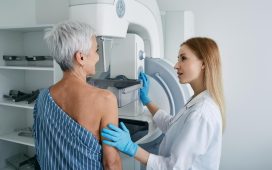The 103rd Annual American College of Surgeons Clinical Congress
The annual meeting of the American College of Surgeons was held from Oct. 22 to 26 in San Diego and attracted approximately 14,000 participants from around the world, including surgeons, medical experts, allied health professionals, and administrators. The conference included hundreds of general and specialty sessions, postgraduate courses, scientific paper presentations, video-based education presentations, and posters focused on the latest advances in surgical care.
In one study, Zain G. Hashmi, M.D., of Sinai Hospital in Baltimore, and colleagues found that states with poor access to trauma center care had more pre-hospital deaths than states with better access, which may contribute to higher overall trauma-related mortality.
“If all states improved access to trauma center care, 130,000 lives could potentially be saved after injury,” said Hashmi. “In the short term, this does not impact clinical practice. However, at a systems level, it provides the necessary evidence to advance the science and advocacy to help improve pre-hospital care.”
News Release
In another study, P. Ravi Kiran, M.D., of Columbia University in New York City, and colleagues evaluated outcomes associated with colorectal resection procedures spanning 10 years of the American College of Surgeons National Surgical Quality Improvement Program (ACS NSQIP).
“Over the period, we found reductions in mortality, infections — specifically surgical site infections — and respiratory complications,” said Kiran.
The investigators also found reductions in length of hospital stay. Improvements in these post-operative outcomes occurred in the decade after introduction of ACS NSQIP independent of other factors.
“The ACS NSQIP has developed an effective mechanism that allows the collection of predefined, robust perioperative data to help risk stratification and then the recording of outcomes using standardized definitions across the board. Considering the quality of these data, valuable information related to anticipated recovery and outcomes after colorectal surgery is available and can be used for benchmarking,” said Kiran. “The mere availability of such good-quality information begets better outcomes since providers and institutions strive to ensure that patients managed by them do as well as expected.”
News Release
In an analysis of the ACS NSQIP database, Timothy M. Ullmann, M.D., of Weill Cornell Medical College in New York City, and colleagues found that an increasing number of thyroid cancer patients are being treated with hemithyroidectomy rather than total thyroidectomy. Specifically, at NSQIP-participating hospitals, the percentage of thyroid cancer patients treated with hemithyroidectomy seems to have increased from 15.6 percent to 18.3 percent.
“We believe this is, at least in part, a result of a recent change in the American Thyroid Association guidelines for treatment of patients with the most common type of thyroid cancer,” said Ullman. “Additionally, we found that patients undergoing hemithyroidectomy have fewer superficial wound infections, are less likely to need their breathing tube reinserted after surgery, and are more likely to be able to leave the hospital the same day they have surgery than patients undergoing total thyroidectomy.”
News Release
Stephen F. Markowiak, M.D., of the University of Toledo in Ohio, and colleagues studied the social determinants of health and community factors related to mass shooting events. The investigators found that communities in which mass shootings have occurred are, on average, more urban and population-dense, with fewer social associations per person and higher proportions of men aged 20 to 44 years.
“On an initial review, it would appear that because mass shooting events tend to occur in urban settings where there are more than twice as many mental health professionals per capita, and stronger gun laws, that these measures are inadequate to prevent ‘random’ mass shootings. We went on to account for population density, urban characteristic, proportion of males 20 to 44 in the community, and population and were able to glean interesting results,” said Markowiak. “We found that after accounting for the above, laws related to restricting child access, disarming dangerous persons, mandatory reporting of mental health records to the national instant criminal background check, restrictions on open carry, and mandatory waiting periods were statistically associated with reduced rates of mass shooting events.”
According to Markowiak, communities should work to address their overall health and rectify disparities in social determinants of health.
“I would advise clinicians to work towards improving the overall health and wellness of their communities whenever possible, be aware of common mental health issues at every patient encounter and help them access care, and encourage patients who share that they own firearms to practice safe behaviors,” said Markowiak.
News Release
ACS: Opiate-Free Surgery Feasible for Elective Colectomy
TUESDAY, Oct. 23, 2018 (HealthDay News) — Opiate-free surgery is feasible for patients undergoing elective colon resections with anastomosis, with shorter length of stay for patients not receiving narcotics, according to a study presented at the annual meeting of the American College of Surgeons, held from Oct. 21 to 25 in Boston.
ACS: Accepting Liver From Older Donor Better Than Waiting
TUESDAY, Oct. 23, 2018 (HealthDay News) — Accepting a liver from an older liver donor is associated with long-term survival benefit, according to a study presented at the annual meeting of the American College of Surgeons, held from Oct. 21 to 25 in Boston.
Copyright © 2018 HealthDay. All rights reserved.







